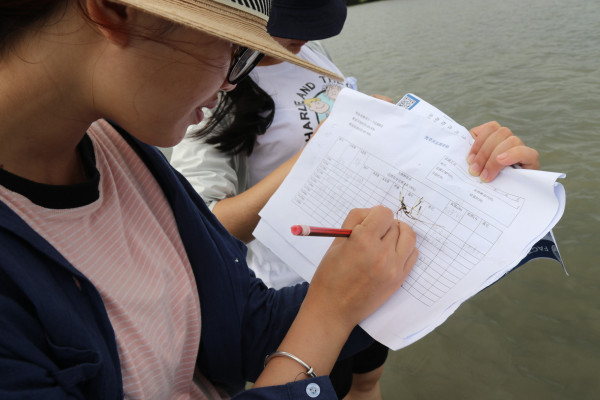17.04.2019 | In collaboration with local partners the Leibniz Centre for Tropical Marine Research (ZMT) recently started one of the first seagrass monitoring events to be undertaken by 26 citizens on the Chinese island of Hainan. Seagrass meadows are highly productive coastal habitats that provide coastal protection from erosion and storms on the one hand, and a habitat for a large number of fish and molluscs on the other hand. As so-called carbon sinks, they absorb CO2 from the atmosphere and thus have a positive influence on climate. Studies from ZMT scientists have shown that seagrass meadows have been declining over the past few decades. This is particularly severe in South-Eastern Asia. For the future protection of seagrass ecosystems it is therefore vital to also engage of local stakeholders.
In a first step, 15 volunteers and nine rangers from local nature reserves took part in a training workshop organized by ZMT's knowledge exchange expert Dr. Jialin Zhang. The participants learned about seagrass ecology and survey methodology. Two monitoring sites have since been established, where, at each site, several 50cm x 50cm quadrats are placed along three parallel 50m transects and surveyed for seagrass diversity, cover and canopy height. The monitoring activities will be conducted by the locals in regular intervals for the next two years. Dr. Zhang was also interviewed on local radio to further spread the word on these activities.
This 'Citizen Science' project integrates public outreach and scientific data collection to enhance public knowledge about the value of seagrasses. It can provide the interested public with an opportunity to assist in research, it can also help scientists to integrate scientific and local knowledge and engage local stakeholders to implement conservation measures.
'Citizen Science' is one of the measures in the portfolio of stakeholder involvement within ZMT’s Sino-German collaboration project TICAS (Tackling Environmental Change Issues of China’s Coastal Aquatic Systems), led by Dr. Tim Jennerjahn at ZMT and jointly funded by the German Federal Ministry of Education and Research (BMBF) and the Chinese State Oceanic Administration (SOA).
The event on Hainan aims at increasing public awareness of the values of intact coastal ecosystems and thus creating an interface between science and society by initiating a stakeholder dialogue. It facilitates the transfer of newly obtained knowledge of the Sino-German research project ECOLOC (Environmental Change Affecting COastal Ecosystems of Tropical China during the Anthropocene) to stakeholders and requests their feedback in order to identify environmental problems and further research needs.



















